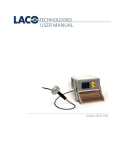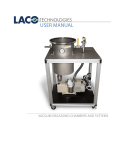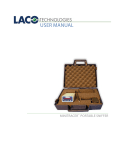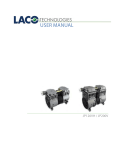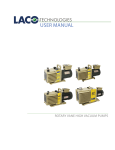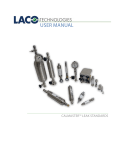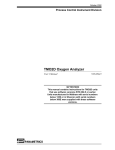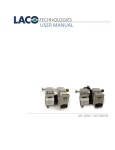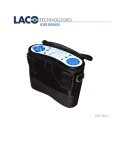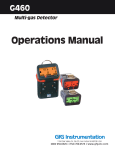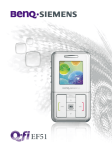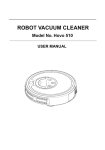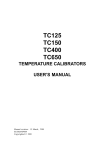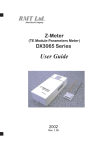Download Downloadable - LACO Technologies, Inc.
Transcript
USER MANUAL UNDERGROUND HELIUM LEAK DETECTOR CONTACT US PHONE/FAX Toll Free: 800.465.1004 Phone: 801.486.1004 Fax: 801.486.1007 ADDRESS LACO Technologies, Inc. 3085 West Directors Row Salt Lake City, UT 84104 WEB www.lacotech.com [email protected] SMT-07-1011 Rev A2 ii © 2010 LACO TECHNOLOGIES, INC. CONTENTS 1. SCOPE .................................................................................... 1 2. SAFETY ................................................................................. 2 3. SPECIFICATIONS.................................................................. 2 4. PREPARATION ...................................................................... 3 5. BASIC OPERATION .............................................................. 4 6. MAINTENANCE .................................................................. 11 7. SERVICE ............................................................................... 14 8. PARTS LIST .......................................................................... 14 iii © 2010 LACO TECHNOLOGIES, INC. LACO LEAK DETECTOR MANUAL - LHHLD-2002 UNDERGROUND HELIUM LEAK DETECTOR 1. SCOPE This manual contains installation, operation, maintenance, and troubleshooting information for LHHLD-2002 Underground Helium Leak Detector. Our leak detectors are designed to ensure safety when used properly. It is the responsibility of the user to follow safety-related warnings, cautions, notes, and other requirements described in this manual. 1.1 WARRANTY LACO Technologies warrants to the original Customer that all new and unused goods furnished by Seller shall be free from defect in workmanship and material at the time and place of delivery by LACO. For distributed products resold by LACO the warranty of the original manufacturer will apply and is available upon request. In the case of repair services or refurbished products sold by LACO the following warranty periods and conditions will apply: Refurbished and Rebuilt Rotary Vane Vacuum Pumps - 6 months. Refurbished and Rebuilt Helium Leak Detectors, Turbo Pumps, Electronic Repairs, and Vacuum Gauges - 3 months. For LACO manufactured products LACO will honor claims in the event of failure of goods (other than expendable and consumable parts) as a result of such a defect provided that claim is made to LACO within twelve months from the date of delivery. LACO DISCLAIMS all other express warranties and all implied warranties, including implied warranties of MERCHANTABILITY and FITNESS FOR PARTICULAR PURPOSES. Items not covered under warranty included damage due to shipping, process conditions, or negligence. LACO also DISCLAIMS damages due to normal wear, failure to follow LACO’s recommended maintenance intervals, incorrect maintenance, disregard of operating instructions, inappropriate working conditions, improper materials, chemical or electrical influences, faulty installation or other causes beyond the control of LACO. Modifications or repairs made by the Customer without LACO’s written consent render this warranty inoperable. Repair work warranties do not cover items that were not replaced or repaired as part of the charged repair services. LACO products must be returned to LACO for warranty and other servicing, and the customer will be responsible for all shipping, insurance and other costs in connection with sending the goods to and from LACO. In case of LACO’s breach of warranty or any other duty with respect to the quality of any goods, the exclusive remedies therefore are, at LACO’s option, (1) repair, (2) replacement or (3) in appropriate cases, payment of or credit for the purchase price (less reasonable depreciation) on authorized return of the goods. 1 © 2010 LACO TECHNOLOGIES, INC. LACO LEAK DETECTOR MANUAL - LHHLD-2002 UNDERGROUND HELIUM LEAK DETECTOR 2. SAFETY CAUTION It is imperative that the user of this device observe all safety guidelines listed below to prevent personal injury, property damage or damage to this detector. • Do not operate the device if it has been damaged. Refer to qualified factory service personnel referenced under Service Information. • Do not disassemble the device; doing so will void your warranty. Only qualified factory service personnel should perform repairs. • Do not draw water into the helium detector. Water vapor in the air is normal, and the silica filter is designed to eliminate this amount of moisture. However, water will not only adversely affect the unit’s operation, but may cause sever damage. Water found inside the unit will void the warranty. • Use precautions when operating the detector in rain, snow or adverse conditions. Although the detector is water resistant, it is not waterproof. Do not allow water to accumulate on the faceplate, as it could migrate into the electronics. • Do not use the probe tip to dig in the soil, or in any manner other than directed in this manual. • Although this device has been designed to operate with a batter voltage as low as 6V, do not operate the detector when the battery indicator displays 1/4 battery or less. False readings will occur when operated under this conditions. See 6.4 BATTERY REPLACEMENT for replacing the battery or recharging the battery. 3. SPECIFICATIONS Table 1: LHHLD-2002 Specifications COMPONENT DESCRIPTION DIMENSIONS LxWxD 33.7 cm x 12.3 cm x 8.3 cm (13.3 in x 4.9 in x 3.3 in) WEIGHT LHHLD-2002 only 1400 grams (3.1 lbs) Shipping weight 6800 grams (15.0 lbs) TEMPERATURE RANGE -10c to +45c (+14F to +113F) HUMIDITY RANGE 20% RG to 50% RH SENSITIVITY Minimum 25 PPM Maximum 1,000,000 PPM (100%) Increment 25 PPM SELECTIVITY Hydrogen (H2)/Helium (He) 2 © 2010 LACO TECHNOLOGIES, INC. LACO LEAK DETECTOR MANUAL - LHHLD-2002 UNDERGROUND HELIUM LEAK DETECTOR COMPONENT DESCRIPTION RESOLUTION Low range =?- 25 PPM High range +/- 0.2% RESPONSE TIME 2 seconds (approx.) AUDIO OUT Pulse Width Modulation LCD 128 Bit x 64 Bit Dot Matrix with long life backlight PROCESSOR Type Infineon (16 Bit) Speed 20 MHZ ROM 512 KBytes Voltage 7.2 VDC Type Nickel Metal Hydride Weight 383.0 grams Run Time 6-8 hours continuous Charging Cycles 300-500 Charging Volts 9.5 - 14 VDC @ 2A BATTERY 4. PREPARATION 1. Upon delivery, immediately inspect the LHHLD-2002 for any physical damage that may have been caused during shipping. NOTE The manufacturer’s warranty does not cover damage caused in transit. You must notify your carrier immediately for any damage claims. 2. Turn the device over and open the battery compartment door. Remove the batter to expose the device information placard. Write the unit serial number on the warranty information card. 3. Connect the battery plug to the main logic board. Close the battery compartment door and secure with the quarter turn fastener. 4. First, plug the universal power supply into an AC wall outlet. Then, plug the other end into the device. NOTE Charge battery for two hours before operating the LHHLD-2002 for the first time. 5. Complete the warranty information card supplied with the instrument, and return it for your warranty registration. 6. Check the silica gel filter. Ensure the color is blue. Refer to 6.2 FILTER REPLACEMENT for filter changing instructions, or 6.3 CLEARING THE SILICA GEL FILTER for filter clearing instructions. 3 © 2010 LACO TECHNOLOGIES, INC. LACO LEAK DETECTOR MANUAL - LHHLD-2002 UNDERGROUND HELIUM LEAK DETECTOR 7. Before turning on the device, connect either the needle probe or one of the extension rods to the probe assembly. Then connect the probe assembly to the detector. The probe assembly has check valves that keep the ambient air from deteriorating the effectiveness of the silica gel filter. 5. BASIC OPERATION 5.1 OVERVIEW The LHHLD-2002 is a portable leak locating and pinpointing device that detects both Hydrogen (H2) and Helium (He) when these are used as a tracer gas in a multitude of pressurized systems. The characteristic of being lighter than air allows both Hydrogen (H2) and Helium (He) to penetrate small leaks rapidly and permeate through the densest soils and pavements quickly. Our helium detector products are used today in many industries and applications, including: military RF systems, high voltage AC power systems, high definition television, chemical manufacturing, cellular and analog telecommunication, and industries utilizing above and below ground storage tanks. 5.2 DISCLAIMER The Occupational Safety and Health Administration (OSHA) states that the lower explosive limit for hydrogen (H2) gas is under 5%. Any concentration above this level, whether intentionally mixed or accidentally trapped in a confined space, is highly explosive and unstable. Since the LHHLD-2002 is capable of detecting both Hydrogen (H2) and Helium (He) gas without any operator intervention, we recommend that if you do use Hydrogen (H2) gas, mix the remaining 96% with Helium (He) gas for 100% usability and added safety. 5.3 THEORY OF OPERATION The LHHLD-2002 is a 16-bit microprocessor controlled precision instrument that operates on the principle of changing thermal conductivity to locate a specific tracer gas as well as quantifying its local concentration. Air, or what we call “air”, is actually made up of a range of gasses. Some of those gasses are pure elements, some are naturally occurring simple compounds, while others are complex man-made compounds. Table 2: Gasses Found in Air shows a list of the twelve most abundant gasses that comprise what we term as “air”. The table has been 4 © 2010 LACO TECHNOLOGIES, INC. LACO LEAK DETECTOR MANUAL - LHHLD-2002 UNDERGROUND HELIUM LEAK DETECTOR arranged in decreasing order of concentration, yet also provides other useful information such as chemical name, chemical symbol, percent in normal air, concentration in parts per million, parts per billion, and atomic weights. The naturally occurring elemental gasses are Nitrogen (N2), Oxygen (02), Argon (Ar), Neon, (Ne), Helium (He), Krypton (Kr), Hydrogen (H2), and Xenon (Xe). NOTE The subscript of 2 in the atomic symbol shows that the gaseous form of the element normally occurs when it is bonded with another of its own kind. If the elemental gas does not have a subscript, that gas has a full outer electron shell and will not react or bond with any other element. These few elements are known as “Nobel” gasses. Table 2: Gasses found in Air GAS PRESENT SYMBOL MOLE PERCENT PARTS PER MILLION PARTS PER BILLION PARTS PER MOLE ATOMIC WEIGHT GRAMS PER MOLE Nitrogen N2 78.082700 780,827 780,827,000 4.7 E+23 28.0135 Oxygen O2 20.945700 209,457 2 09,457,000 1.26 E+23 31.0099 Argon Ar 0.934000 9,340 9,340,000 5.62 E+21 39.9480 Carbon Dioxide CO2 0.035000 350 350,000 2.11 E+20 44.0100 Neon Ne 0.001718 17.18 17,180 1.03 E+19 20.1797 Helium He 0.00524 5.24 5,240 3.16 E+18 4.0026 Methane Ch4 0.000170 1.70 1,700 1.02 E+18 16.0380 Krypton Kr 0.000114 1.14 1,140 6.87 E+17 83.8000 Hydrogen H2 0.000053 0.53 530 3.19 E+17 2.0159 Nitrous Oxide N2O 0.000031 0.31 310 1.87 E+17 44.0100 Xenon Xe 0.000009 0.09 87 5.23 E+16 131.2900 Ozone O3 0.000003 0.03 25 1.51 E+16 47.9982 All the gasses listed in Table 2, as well as those that are not, possess an intrinsic property called thermal conductivity (TC). Thermal conductivity’s unit of measure is watts/m °K. One way to explain TC is its ability to absorb heat or whisk away heat from a heat source. An easy way to think about this is to remember how hot you feel when you sweat. Air helps to cool your body temperature. Table 3: Thermal Conductivity of Gasses shows the TC for clean, dry air (CDA) as well as its nine most abundant components. For example CDA has a TC constant of 0.026. since it’s mostly comprised of nitrogen (78.1%) that has a TC of 0.026. The next most abundant gas is oxygen (20.0%) with a TC of 0.027. This is remarkably close to nitrogen, and thus stays very close to 0.026. The third highest concentration in CDA is Argon (0.9%) with a TC of 0.018. But, since its relative abundance in the atmosphere is so small, it has a very small impact on the overall TC of air. 5 © 2010 LACO TECHNOLOGIES, INC. LACO LEAK DETECTOR MANUAL - LHHLD-2002 UNDERGROUND HELIUM LEAK DETECTOR NOTE As the numbers increase, the TC of the gasses increase, with Hydrogen (H2) and Helium (He) being the most thermally conductive. It’s this distinction between the TC of CDA as compared to the TC of hydrogen or helium that we are interested in. Our LHHLD-2002 is designed with two ranges. The low range detects gas between 25 and 20,000 parts per million (ppm) in increments of 25 ppm. Mathematically 20,000 ppm is a concentration of 2%. The high range is between 2% and 100%. Calibration of the LHHLD-2002 is accomplished via the microprocessor. Initially when the sample air contains no (zero) tracer gas, it will draw in 100% CDA. The microprocessor is then told that the reading it is receiving is to be referred to as “Zero”. Using a known, controlled volume of CDA, 2% tracer gas (scientific grade) is injected into a closed loop. The accuracy of the gas is 2.00%, and the detector should read 2.00%. This settings is then stored in memory. The last calibration point is to draw in 100% scientific grade tracer gas, and the reading stored in memory. Since the TC of the tracer gas is constant, the readings observed are directly proportional to the concentration received. Another way to state this is that two points make a straight line, and the more points given, the more accurate the straight line will be. After the calibration process, any concentration sampled will fall on the line. Table 3: Thermal Conductivity of Gasses THERMAL CONDUCTIVITY AT 300 K (WATTS/M °K) Air 0.026 Ar 0.018 CO 0.025 CO2 0.017 H 0.182 He 0.151 N2 0.026 Ne 0.049 O2 0.027 5.4 HUMIDITY VS. ACCURACY As stated earlier, water vapor or H20 is a normal component of air. The unit of measure of humidity is known as %RH, or percent relative humidity. An average value of humidity on a normal dry day is 20%. On a very humid day, it can reach into the nineties or 100% when raining (misting). The MGD can correctly function with RH levels as high as 50%, but any value above 50% results in what is seen as negative gas. 6 © 2010 LACO TECHNOLOGIES, INC. LACO LEAK DETECTOR MANUAL - LHHLD-2002 UNDERGROUND HELIUM LEAK DETECTOR Another way to state this is when the humidity goes, up, the accuracy goes down, with humidity and accuracy being inverses of one another. This does not mean that the LHHLD-2002 cannot be used when the humidity is above 20%. The wand section contains three independent filters: one removes water vapor, one removes chlorofluorocarbons, and the last removes large particulates. 5.5 MOISTURE FILTER Our replacement filter cartridge system removes almost 100% of the moisture from the sample air before entering the sensing compartment. This innovative procedure allows the user to quickly assess the daily lifespan of the filter by simple visual cues. A new dry cartridge will be vividly bright blue in color. The moisture cartridge will turn pink as it removes moisture from the air (see Figure 1). The filter cartridge is still within its useful life, but will degrade further to a clear white color if continually used in a high humidity environment or if water is present. The useful life of these filters depends on the relative humidity (%RH) of the working environment. For example, on an average dry day, the %RH is roughly 20%. Under this conditions the filter should last between four to six hours. If the relative humidity climbs to 50% RH, the single cartridge might last only two to three hours. If the humidity climbs to between 50 -90%RH, the filter may only last one hour. Even on the most humid of days, these filters can be replaced within seconds or cleared and reused within minutes. For information on cleaning filters, see 6.3 CLEARING THE SILICA GEL FILTER. Figure 1 5.6 METHANE VS. ACCURACY There are certain gasses that the LHHLD-2002 cannot eliminate, and methane (CH4) is the most significant. Just like humidity, methane has a warming effect. Referring to Table 3: Thermal Conductivity of Gasses, the higher the TC number, the greater the cooling effect. Methane’s small value causes it to act like a negative tracer gas. It has a warming thermoconductivity or -TC. What makes methane so problematic is that it is very small and can pass through most filters without detection 7 © 2010 LACO TECHNOLOGIES, INC. LACO LEAK DETECTOR MANUAL - LHHLD-2002 UNDERGROUND HELIUM LEAK DETECTOR or elimination. The only way to eliminate methane is to burn it off. Unfortunately, in a handheld device, burning off stray gasses is not an option. Other gasses such as Propane (C2H8), Pentane (C5H12), and Ethane (N20, and Ozone (O3), and most other CFCs also have a negative TC (-TC). However, these gasses are easily eliminated by the second filter in the wand section. Unfortunately, the crushed activated charcoal has a limited useful life when used in an environment of high organic compounds such as those mentioned above. Therefore, we strongly suggest returning the LHHLD-2002 for recalibration at least once a year. During factory recalibration, the silica gel filters are cleared and the other two filters are replaced. 5.7 KEY-BY-KEY OPERATION The LHHLD-2002 features high tech “membrane” switches, with a large multifunction liquid crystal display and patented filter system. Each key of the membrane switch features a raised embossed edge that is designed to be felt when wearing protective gloves. The switches themselves require 12 in-oz of pressure for the contacts to close and will generate a noticeable click that is both felt and heard. The following is a description of each button on the LHHLD-2002. Table 4: LHHLD-2002 Button Descriptions CONTROL NAME DESCRIPTION ON/OFF The ON/OFF button supplies power to the instrument. Once the unit is turned on, it will initialize, then conduct a 30-second power on self test (POST). The instrument will turn off automatically when left unattended for longer than 15 minutes. LIGHT The light button is used to turn on and off the LCD backlight. By default, the LCD backlight is turned off to conserve battery life. To turn on the backlight, push this button once. The backlight will illuminate and will remain on until the button is pressed again or the unit is turned off. SOUND The sound button is used to turn on and off the audio output of the internal speaker, allowing the operator the ability to hear the detection of the tracer gas. By default the audio output is turned off. PROBE The probe button is only used in the manual mode, and tells the microprocessor how many physical lengths of probe are attached to the unit. This is done to mathematically calculate how long it will take to get a sample from the boot to the sensing elements. 8 © 2010 LACO TECHNOLOGIES, INC. LACO LEAK DETECTOR MANUAL - LHHLD-2002 UNDERGROUND HELIUM LEAK DETECTOR CONTROL 5.8 NAME DESCRIPTION RESET The reset button allows the unit to remain powered but clears all of the internal logic circuitry. The device goes through its zeroing routine to determine a new baseline. This button is preferred to turning the device off and back on, since the sensor remains stable. Only press this button in a zero tracer gas environment. MODE The mode button controls the content of the LCD. By default, the unit is in automatic mode and will show what the sensing elements have detected in both concentration as well as time. If the unit is placed in the manual mode, the device will continue to draw in samples as normal. However, when the sample button is pressed, the LCD no longer shows time; it will only show what the sensors are currently detecting. SAMPLE The sample button tells the microprocessor to take one reading. Upon pressing this button, the microprocessor 1) determines calculates how long it should take for the sample to get to the detector., 2) takes the sample, and 3) displays the result. This is a “one shot” button, meaning that the button must be pressed each time a new sample is needed. LCD The LCD is a near real-time display of the tracer gas the unit has detected. The refresh rate is slightly greater than ten times every second. Figure 2 shows the liquid crystal display upon pressing the On/Off button. This screen will remain displayed while the processor conducts a power on self-test which will last for approximately 60 seconds. Figure 2: LCD “ON” display Figure 3 shows the successful completion of the power on self-test, or when the unit has just been reset. This display is showing the user that the unit is attempting to locate a zero point of reference. Figure 3: After reset 9 © 2010 LACO TECHNOLOGIES, INC. LACO LEAK DETECTOR MANUAL - LHHLD-2002 UNDERGROUND HELIUM LEAK DETECTOR Figure 4 shows the display upon successful completion of the initial zeroing routine. This screen will remain in effect until the sensor elements sense the presence of a tracer gas. The real time graph is updated once per second and shows 60 seconds of history. Figure 4: Completion of Zero routine 5.9 LCD STATUS ICONS There are five small icons shown at the bottom of the LCD screen. The icons and their functions are displayed below in the order they appear on the LCD (from left to right). Table 5: LCD Status Icons ICON NAME DESCRIPTION BATTERY STATUS This icon gives the user a visual indicator of the relative lifespan remaining on the battery. When the battery drops below 1/4, a warning beep will sound. The unit will automatically shut off when an empty battery is shown. RECHARGE STATUS The recharge status icon indicates the status of a unit as it is recharged. If the unit is recharging, the icon will change to a lightening bold. When recharging is complete, the icon will display a plug. MODE The mode icon will display one of the two possible modes of operation: automatic (A) or manual (B). SOUND STATUS When disabled (a device default in order to conserve the battery), the sound status icon shows an X through the speaker. Press the sound button to enable the audio output. PROBE LENGTH The probe length icon is only used in the manual mode. When the sample button is pressed, the microprocessor takes a reading based on how many lengths of probe are being used. This icon shows how many lengths, the timing based on the lengths used, and the lengths displayed. 10 © 2010 LACO TECHNOLOGIES, INC. LACO LEAK DETECTOR MANUAL - LHHLD-2002 UNDERGROUND HELIUM LEAK DETECTOR 6. MAINTENANCE 6.1 CLEANING AND INSPECTION Table 6: Cleaning and Inspection PART INSTRUCTIONS INSTRUMENT Clean away any debris or moisture accumulation with a clean, soft, moist (not wet) cloth. Dirt or sand can scratch the lexan protective lens over the LCD. Check exhaust ports on the top right side of the unit (small brass fitting) for any obstructions. COLLECTION BOOT Clean with compressed air with soap and water to remove mud and debris. Dry thoroughly when done. SMALL PROBE TIP Clean with compressed air or with soap and water to remove mud and debris. Dry thoroughly when done. EXTENSIONS Clean with compressed air or with soap and water to remove mud and debris. Dry thoroughly when done. FILTER Check the filters in handle before every use. If the cartridge is pink or whitish in color, replace the cartridge following the steps provided below. The filter section can be cleaned with soap and water as long as the silica filter is in place and the knurled cap section is tightened firmly. CAUTION 6.2 Do not allow water to enter the charcoal filter. FILTER REPLACEMENT In order to replace the silica gel filter, firmly grip the filter handle with one hand and turn the knurled cap assembly counterclockwise until they separate. Once the cap assembly is removed, turn the handle over so the filter will slide out using only gravity. If the filter does not slide out voluntarily, hold the handle upside down and lightly tap the side of the handle against a solid object. The filter will slide out. With the spent filter cartridge removed, ensure there is no foreign material in the handle section. If the path is clear, replace a new (blue) silica gel filter. Replace the cap assembly using minimal force turning clockwise. 6.3 CLEARING THE SILICA GEL FILTER To restore these cartridges to a useful condition (dry with a deep blue color as shown in Figure 1), backflush the handheld probe with compressed, dry air or dry nitrogen. Use the needle probe connected to the front end of the probe handle and the back flushing air chuck assembly connected to the hose (Figure 5). The needle probe must be installed in order to defeat the one-way check valve and allow air to flow back through the filter. Figure 6 below shows the chuck valve attached to a Dielectric air dryer directing clean, dry (CDA) back through the silica. This process will take approximately 10 minutes per silica gel filter. 11 © 2010 LACO TECHNOLOGIES, INC. LACO LEAK DETECTOR MANUAL - LHHLD-2002 UNDERGROUND HELIUM LEAK DETECTOR Figure 5 Figure 6 6.4 BATTERY REPLACEMENT Turn the device over and remove the battery compartment cover using a flat tip screwdriver. The fastener requires only minimal pressure and a 1/4 turn counterclockwise. Remove the battery and pull up on the three-pin connector. This connector is keyed to ensure one-way installation. Before installing the new battery, ensure the power connector is attached to the circuit board. Once the battery jack is connected, lay the battery in its berth and replace the battery compartment cover. NOTE 6.5 The screw requires minimal pressure and only a 1/4 turn clockwise. BATTERY RECHARGING The LHHLD-2002 comes equipped with the jacks and adaptors necessary to recharge your unit whether you’re in the office or working on-site. Refer to Table 7: Parts List for a list of items that comes standard with this device. 12 © 2010 LACO TECHNOLOGIES, INC. LACO LEAK DETECTOR MANUAL - LHHLD-2002 UNDERGROUND HELIUM LEAK DETECTOR To charge this device using the universal power supply, 1) plug in the universal AC power supply to any standard wall outlet and 2) plug in the DC output plug to the device. The internal software will detect the presence of the charger and will turn off the detection capability while the unit is in charge. To charge this device using the standard 12VDC auto adaptor, 1) plug the auto adaptor into the cigarette lighter jack, and 2) plug the output jack into the device. The internal software will detect the presence of the charger and will turn off the detection capability while the unit is charging. The Nickel Metal Hydride (NiMh) battery is equipped with a temperature sensing element to ensure the battery will not overheat and explode during the charge cycle. Should the ambient temperature be too hot, the sensor may cause the recharge the circuitry to shut off prematurely. For this reason, it is recommended that this unit is charged away from any heat source. If the device is unused for an extended period of time, the battery will lose 40% of their charge during the first month and 20% every month thereafter. It is highly recommended that the unit be recharged before use. 6.6 CALIBRATION The LHHLD-2002 is a precision measuring device that requires factory calibration in order to ensure sustained and optimum operating performance. Calibration frequency is dependent on: 1) environmental conditions when using the device (harsh environments, clean rooms, etc.), 2) user criteria for the device (high accuracy vs. identifying gas concentrations) and 3) the amount of time the device is used (once a month vs. daily). We recommend that devices with high usage or if precision is required, calibration should be done at least once a year. If the device is used infrequently or accuracy is not as critical, factory recalibration can be every two years. Calibration is not limited to the recommended calibration schedule. If the user suspects inaccurate operation as a result of filters or plumbing being compromised with oil residue, oil vapors, water, dirt, petroleum vapors, recalibration is recommended. During factory recalibration, the following value-added steps will take place: 1. Inspection 2. Light cleaning (as required) 3. Silica gel filter dried (as required) 13 © 2010 LACO TECHNOLOGIES, INC. LACO LEAK DETECTOR MANUAL - LHHLD-2002 UNDERGROUND HELIUM LEAK DETECTOR 4. Carbon filter replaced 5. Intake and exhaust filter replaced 6. Air volume checked and adjusted 7. Temperature sensors checked and adjusted 8. Software updates installed (as available) 9. Calibration procedure completed 10. ISO Calibration Certificate (optional) 7. SERVICE If service or calibration is needed, contact LACO for a material return authorization number (MRA). The device should be boxed securely and contain all contact information, including return shipping information. A written statement of the problem or symptoms should then be included. The MRA number must be on the outside of the package or indicated on the shipping label. 8. PARTS LIST 8.1 STANDARD PACKAGE The following components are standard with the LHHLD-2002. Upon initial receipt of the LHHLD-2002, check to ensure that all items have been received. Numbers in parenthesis indicate the quantity. Table 7: Parts List PART NUMBER PART 79776 LHHLD-2002 Leak Detector 84972 Silica gel drying adaptor 83325 Probe assembly 82492 7.2V Nickel Metal Hydride battery 84923 Carrying strap 84677 12VDC auto plug-in adaptor 84673 100-24VAC Universal AC charger w/North American power cord 84674 European power cord 84210 Boot housing 83325 Extension rods (2) 84371 Instruction booklet (IB-417) 84973 Warranty card (serialized) 84165 Needle probe 83220 Moisture cartridge (2) 84762 Carrying case 14 © 2010 LACO TECHNOLOGIES, INC. LACO LEAK DETECTOR MANUAL - LHHLD-2002 UNDERGROUND HELIUM LEAK DETECTOR 8.2 REPLACEABLE PARTS If for any reason a field replaceable unit (FRU) is required, the following list of items is provided to ease the ordering process. NOTE Only user replaceable items are listed. If you require an item not on this list, you must return the device for calibration Table 8: Replaceable Parts PART NUMBER PART 83220 Moisture cartridge 82492 Spare battery 84210 Boot housing 84677 12VDC auto plug-in adaptor 84673 100-24VAC Universal AC charger 84674 European power cord 83325 Extension rods (2) 84165 Needle probe 8.3 ACCESSORIES The following list contains non-standard accessories recommended for use with the LHHLD-2002. Table 9: Accessories PART NUMBER PART 882-0007 Headphones N/A Overhead wire boot N/A Non-metallic probe assembly N/A Downloadable software revisions 15 © 2010 LACO TECHNOLOGIES, INC.



















